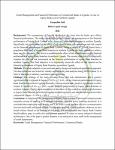| dc.description.abstract | Background: The management of the risk involved in the loans that the banks give affects
financial performance. The study examined the effect of credit risk management on the financial
performance of Equity Bank Limited with a focus on Equity Bank branches in northern Uganda.
Specifically, the study looked at the effect of risk identification, risk assessment and risk control
on the financial performance of equity Bank Limited. Using a sample of 73 staff drawn from a
population of 90 staff of equity Bank branches in northern Uganda, the study attempts to achieve
three specific objectives. The first is to established the effect of risk identification on the financial
performance of equity Bank branches in northern Uganda. The second objective is to empirically
examine the effect of risk assessment on the financial performance of equity Bank branches in
northern Uganda. The final objective is to empirically assess the effect of risk control on the
financial performance of Equity Bank branches in northern Uganda.
Methods: The study adopted a cross-sectional survey design and employed quantitative approach.
The data collection was tested for validity and reliability and analysed using SPSS Version 23 in
form of descriptive statistics, correlation and regressions.
Findings: The findings of the study revealed firstly, that risk identification had a positive
significant effect (Adjusted R Square =39.9%, p < 0.01.) on the financial performance of Equity
Bank branches in northern Uganda. Secondly, risk assessment had a positive significance in effect
(Adjust R Square=45.6%, p < 0.01) on the financial performance of Equity Bank branches in
northern Uganda. Thirdly, the examination of the effect of risk control on financial performance
in Equity Bank branches in Northern Uganda revealed a positive and statistically significant effect
(Adjusted R Square =51.4%, p < 0.01.)
Conclusion: In conclusion, the management of Equity Bank Limited is advised to mitigate gender
inequality among its staffing level through instituting a flexible policy working document. It is
concluded that employing more female staff I the Bank would facilitate effective communication
between bank staffs and female clients. This because majority of loan recipients (debtors) are also
female clients. Based on the findings of this study, it is recommended that Equity Bank Limited
should address gaps in credit risk management practices in order to ensure enhanced financial
performance. One of the gaps is gender disparity in recruitment of more staffs in the management
of credit departments.
Keywords: Credit Management, Financial Performance, Commercial Banks | en_US |

